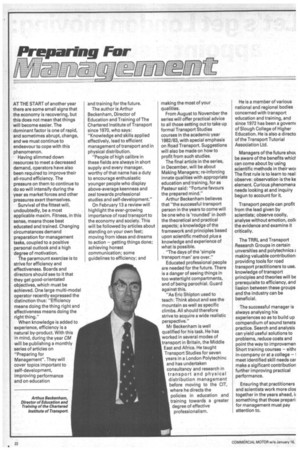Preparing For
Page 18

If you've noticed an error in this article please click here to report it so we can fix it.
AT THE START of another year there are some small signs that the economy is recovering, but this does not mean that things will become easier. The dominant factor is one of rapid, and sometimes abrupt, change, and we must continue to endeavour to cope with this phenomenon.
Having slimmed down resources to meet a decreased demand, operators have also been required to improve their all-round efficiency. The pressure on them to continue to do so will intensify during the year as market forces and other pressures exert themselves.
Survival of the fittest will, undoubtedly, be a most applicable maxim. Fitness, in this sense, means those best educated and trained. Changing circumstances demand preparation for management tasks, coupled to a positive personal outlook and a high degree of motivation.
The paramount exercise is to strive for efficiency and effectiveness. Boards and directors should see to it that they get good-orientated objectives, which must be achieved. One large multi-modal operator recently expressed the distinction thus: "Efficiency means doing the thing right and effectiveness means doing the right thing."
When knowledge is added to experience, efficiency is a natural by-product. With this in mind, during the year CM will be publishing a monthly series of articles on "Preparing for Management". They will cover topics important to self-development, improving performance and on education and training for the future.
The author is Arthur Beckenham, Director of Education and Training of The Chartered Institute of Transport since 1970, who says: "Knowledge and skills applied effectively, lead to efficient management of transport and in physical distribution.
"People of high calibre in these fields are always in short supply and every manager, worthy of that name has a duty to encourage enthusiastic younger people who display above-average keenness and zeal towards professional studies and self-development."
On February 13a review will highlight the ever-growing importance of road transport to the economy and society. This will be followed by articles about standing on your own feet; moving from ideas and dreams to action — getting things done; achieving honest communication; some guidelines to efficiency; and making the most of your qualities.
From August to November the series will offer practical advice to all those setting out to take up formal Transport Studies courses in the academic year 1982/83, with special emphasis on Road Transport. Suggestions will also be made on how to profit from such studies.
The final article in the series, in December, will be about Making Managers; re-inforcing innate qualities with appropriate education and training, for as Pasteur said: "Fortune favours the prepared mind."
Arthur Beckenham believes that "the successful transport person in the years to come will be one who is 'rounded' in both the theoretical and practical aspects; a knowledge of the framework and principles based upon scientific method plus a knowledge and experience of what is possible.
. "The days of the 'simple transport man' are over."
Educated professional people are needed for the future. There is a danger of seeing things in too watertight compartments, and of being parochial. Guard against this.
"As Eric Shipton used to teach: Think about and see the mountain as well as specific climbs. All should therefore strive to acquire a wide realistic perspective."
Mr Beckenham is well qualified for his task. He has worked in several modes of transport in Britain, the Middle East and Africa. He taught Transport Studies for seven years in a London Polytechinc and has undertaken consultancy and research in transport and physical distribution management before moving to the CIT, where he directs the policies in education and training towards a greater degree of effective professionalism. He is a member of various national and regional bodies concerned with transport education and training, and since 1972 has been a govern( of Slough College of Higher Education. He is also a directo of the Transport Tutorial Association Ltd.
Managers of the future shot be aware of the benefits whict can come about by using scientific methods in their woi The first rule is to learn to real observe: observation is the ke element. Curious phenomena needs looking at and inquiry begun to account for it.
Transport people can profit from the lead given by scientists; observe coolly, analyse without emotion, coil: the evidence and examine it critically.
The TRRL and Transport Research Groups in certain unversities and polytechnics E making valuable contribution providing tools for road transport practitioners to use. knowledge of transport principles and theories will bE prerequisite to efficiency, and liasion between these groups and the industry can be beneficial.
The successful manager is always analysing his experiences so as to build up compendium of sound tenets practice. Search and analysis can yield useful solutions to problems, reduce costs and point the way to improvemen Short training courses — eitht in-company or at a college —1 meet identified skill needs car make a sigificant contribution further improving practical performance.
Ensuring that practitioners and scientists work more clos together in the years ahead, something that those prepari for management must pay attention to.










































